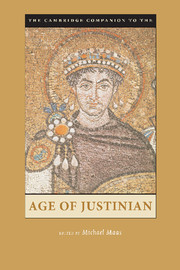Book contents
- Frontmatter
- Part 1 Structures and Ideologies of Empire
- 1 Roman Questions, Byzantine Answers
- 2 Economy and Administration
- 3 Justinian’s Constantinople
- 4 The Classical City in the Sixth Century
- 5 The Empire at War
- 6 Mediterranean Plague in the Age of Justinian
- 7 Law and Legal Practice in the Age of Justinian
- 8 Justinianic Ideology and the Power of the Past
- Part 2 Religion and Philosophy
- Part 3 Literature and the Arts
- Part 4 Peoples and Communities
- Bibliography
- Index
- Plate Section 1
- Plate Section 2
4 - The Classical City in the Sixth Century
Survival and Transformation
from Part 1 - Structures and Ideologies of Empire
Published online by Cambridge University Press: 28 May 2006
- Frontmatter
- Part 1 Structures and Ideologies of Empire
- 1 Roman Questions, Byzantine Answers
- 2 Economy and Administration
- 3 Justinian’s Constantinople
- 4 The Classical City in the Sixth Century
- 5 The Empire at War
- 6 Mediterranean Plague in the Age of Justinian
- 7 Law and Legal Practice in the Age of Justinian
- 8 Justinianic Ideology and the Power of the Past
- Part 2 Religion and Philosophy
- Part 3 Literature and the Arts
- Part 4 Peoples and Communities
- Bibliography
- Index
- Plate Section 1
- Plate Section 2
Summary
In 533 Procopius of Caesarea, scouting for his general Belisarius, met a trader in Syracuse who was, by chance, both a “friend from childhood” and a “fellow-citizen” of Caesarea (Wars, 3.14). On two accounts, Procopius indicates, the man could be counted on for help with a dangerous mission, securing intelligence on the whereabouts of the enemy king and on Roman prospects for an invasion of Vandal Africa. The civic link between the two men, shared citizenship of Caesarea in Palestine, resembled the personal one, for both created claims of one person upon the other, and shared citizenship, like friendship, persisted despite long years abroad in trade or the imperial service. Further, in a hard spot it was apparently one’s native city that counted, what Procopius elsewhere calls “my Caesarea” (Secret History, 11.25), not just being Roman, as both men obviously were, or belonging to the same ethnicity or to one religious persuasion or another. Describing this incident, Procopius suggests, quite by accident, that a robust personal identification with one’s own native city, traditional in ancient Mediterranean culture, persisted in the reign of Justinian.
The incident invites broader investigation into the state of the Mediterranean cities in the sixth century. The agenda in this chapter is to discover whether cities like Caesarea still flourished, how faithful these cities remained to traditional urban forms, and, at least by implication, how firm a grip they still had on their inhabitants, especially on men like Procopius, members of the local elite of urban landowners. These questions are hotly debated nowadays, and clarity would be welcome on so central an issue.
- Type
- Chapter
- Information
- The Cambridge Companion to the Age of Justinian , pp. 87 - 112Publisher: Cambridge University PressPrint publication year: 2005
- 4
- Cited by



